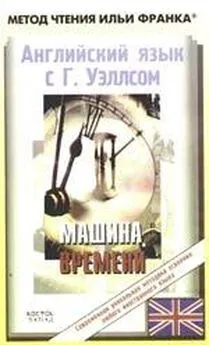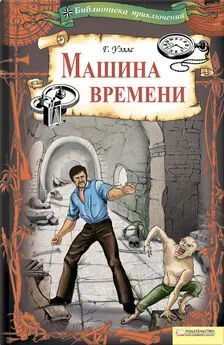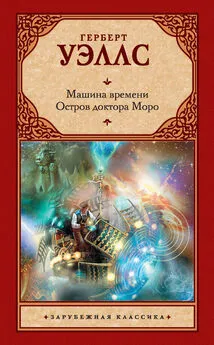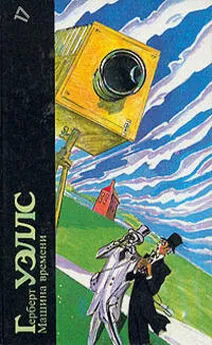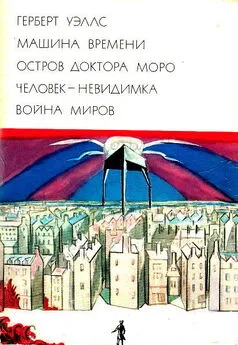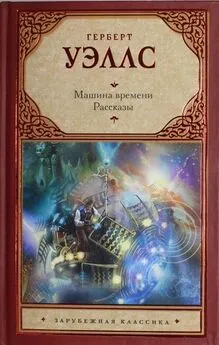H. Wells - Английский язык с Гербертом Уэллсом. Машина Времени
- Название:Английский язык с Гербертом Уэллсом. Машина Времени
- Автор:
- Жанр:
- Издательство:неизвестно
- Год:неизвестен
- ISBN:нет данных
- Рейтинг:
- Избранное:Добавить в избранное
-
Отзывы:
-
Ваша оценка:
H. Wells - Английский язык с Гербертом Уэллсом. Машина Времени краткое содержание
Английский язык с Гербертом Уэллсом. Машина Времени - читать онлайн бесплатно полную версию (весь текст целиком)
Интервал:
Закладка:
haul [hLl], nauseatingly [`nLsIeItINlI], bewilderment [bI`wIldqmqnt]
'In a moment I was clutched by several hands, and there was no mistaking that they were trying to haul me back. I struck another light, and waved it in their dazzled faces. You can scarce imagine how nauseatingly inhuman they looked—those pale, chinless faces and great, lidless, pinkish-grey eyes!—as they stared in their blindness and bewilderment. But I did not stay to look, I promise you: I retreated again, and when my second match had ended, I struck my third.
It had almost burned through when I reached the opening into the shaft (она тоже почти догорела, когда я добрался до входа в шахту). I lay down on the edge, for the throb of the great pump below made me giddy (я прилег на край, потому что стук огромного насоса внизу вызвал у меня головокружение). Then I felt sideways for the projecting hooks (затем я нащупал сбоку крючки), and, as I did so, my feet were grasped from behind, and I was violently tugged backward (и тут же меня схватили за ноги сзади и с силой потащили обратно; to tug — бороться; тащить, дергать/сусилием/ ). I lit my last match ... and it incontinently went out (я зажег последнюю спичку ... она тотчас же погасла). But I had my hand on the climbing bars now, and, kicking violently (но теперь мои руки были на подъемных прутьях и, пинаясь изо всех сил; to kick — пинать/ся/ ), I disengaged myself from the clutches of the Morlocks and was speedily clambering up the shaft (я высвободился из тисков морлоков и начал быстро взбираться по стене колодца; to disengage — освобождать/ся/ ), while they stayed peering and blinking up at me (пока они стояли /внизу/, вглядываясь и щурясь; to blink — мигать, щуриться ): all but one little wretch who followed me for some way (все, кроме одного негодяя, который следовал за мной некоторое время; wretch — несчастный, жалкийчеловек; негодяй ), and well-nigh secured my boot as a trophy (и чуть не завладел моим башмаком в качестве трофея; well-nigh — близко, почти; to secure — охранять, защищать; завладевать, овладевать ).
shaft [SRft], tug [tAg], wretch [reC], trophy [`trqufI]
It had almost burned through when I reached the opening into the shaft. I lay down on the edge, for the throb of the great pump below made me giddy. Then I felt sideways for the projecting hooks, and, as I did so, my feet were grasped from behind, and I was violently tugged backward. I lit my last match ... and it incontinently went out. But I had my hand on the climbing bars now, and, kicking violently, I disengaged myself from the clutches of the Morlocks and was speedily clambering up the shaft, while they stayed peering and blinking up at me: all but one little wretch who followed me for some way, and well-nigh secured my boot as a trophy.
'That climb seemed interminable to me (этот подъем показался мне бесконечным). With the last twenty or thirty feet of it a deadly nausea came upon me (на последних двадцати или тридцати футах я /почувствовал/ ужасную тошноту). I had the greatest difficulty in keeping my hold (я с огромным трудом держался за опору). The last few yards was a frightful struggle against this faintness (последние несколько ярдов были ужасной борьбой с обмороком). Several times my head swam (несколько раз моя голова плыла), and I felt all the sensations of falling (и я ощущал все признаки падения). At last, however, I got over the well-mouth somehow (наконец, однако, я как-то добрался до отверстия колодца), and staggered out of the ruin into the blinding sunlight (и, шатаясь, /выбрался/ из руин на ослепительный солнечный свет). I fell upon my face (я упал лицом /вниз/). Even the soil smelt sweet and clean (даже запах почвы был приятным и чистым; to smell — пахнуть ). Then I remember Weena kissing my hands and ears (я помню, как Уина целовала мои руки и уши), and the voices of others among the Eloi (и голоса других элоев). Then, for a time, I was insensible (а потом, на какое-то время, я лишился чувств: «был бесчувственным»).
thirty [`TWtI], nausea [`nLsIq], insensible [In`sensIbl]
'That climb seemed interminable to me. With the last twenty or thirty feet of it a deadly nausea came upon me. I had the greatest difficulty in keeping my hold. The last few yards was a frightful struggle against this faintness. Several times my head swam, and I felt all the sensations of falling. At last, however, I got over the well-mouth somehow, and staggered out of the ruin into the blinding sunlight. I fell upon my face. Even the soil smelt sweet and clean. Then I remember Weena kissing my hands and ears, and the voices of others among the Eloi. Then, for a time, I was insensible.
[1]Пригород, расположенный в 14 милях к югу от Лондона.
CHAPTER VII
'Now, indeed, I seemed in a worse case than before (теперь, на самом деле, я, казалось, был еще в худшем положении, чем раньше). Hitherto, except during my night's anguish at the loss of the Time Machine (до сих пор, за исключением моих мучений в ночь потери Машины Времени), I had felt a sustaining hope of ultimate escape (я чувствовал поддерживающую /меня/ надежду отдаленного бегства; tosustain— поддерживать, обеспечивать; ultimate — самый отдаленный; последний, конечный; завершающий ), but that hope was staggered by these new discoveries (но эта надежда пошатнулась из-за новых открытий). Hitherto I had merely thought myself impeded by the childish simplicity of the little people (до сих пор я думал, что мне препятствует лишь детская простота = непосредственность маленьких людей; to impede — препятствовать ), and by some unknown forces which I had only to understand to overcome (и какие-то неведомые силы, которые я просто должен понять, чтобы преодолеть); but there was an altogether new element in the sickening quality of the Morlocks (но /теперь/ появился совершенно новый элемент = обстоятельство , /заключающееся/ в отвратительном качестве морлоков; to sicken — заболевать; испытыватьотвращение )—a something inhuman and malign (что-то нечеловеческое и опасное; malign — вредный, дурной; опасный, страшный ). Instinctively I loathed them (инстинктивно я ненавидел их). Before, I had felt as a man might feel who had fallen into a pit (прежде я чувствовал себя, как чувствует себя человек, упавший в яму): my concern was with the pit and how to get out of it (мои мысли были о яме и /о том/, как выбраться из нее). Now I felt like a beast in a trap (теперь же я чувствовал себя, как зверь в капкане), whose enemy would come upon him soon (чей враг придет за ним скоро).
sustain [sq`steIn], simplicity [sImp`lIsItI], malign [mq`laIn]
'Now, indeed, I seemed in a worse case than before. Hitherto, except during my night's anguish at the loss of the Time Machine, I had felt a sustaining hope of ultimate escape, but that hope was staggered by these new discoveries. Hitherto I had merely thought myself impeded by the childish simplicity of the little people, and by some unknown forces which I had only to understand to overcome; but there was an altogether new element in the sickening quality of the Morlocks—a something inhuman and malign. Instinctively I loathed them. Before, I had felt as a man might feel who had fallen into a pit: my concern was with the pit and how to get out of it. Now I felt like a beast in a trap, whose enemy would come upon him soon.
'The enemy I dreaded may surprise you (враг, которого я боялся, может удивить вас). It was the darkness of the new moon (это была темнота в новолуние). Weena had put this into my head by some at first incomprehensible remarks about the Dark Nights (Уина вложила его в мою голову = внушиламнеего несколькими сначала непонятными замечаниями о Темных Ночах; comprehensible — понятный, постижимый, ясный ). It was not now such a very difficult problem to guess what the coming Dark Nights might mean (теперь не было такой /уж/ трудной проблемой догадаться, что могло означать приближение Темных Ночей). The moon was on the wane (луна убывала): each night there was a longer interval of darkness (каждую ночь время темноты было = становилось длиннее). And I now understood to some slight degree at least the reason of the fear of the little Upper-world people for the dark (и теперь я понял хоть в небольшой степени = отчасти , по крайней мере, причину страха маленьких жителей Верхнего Мира перед темнотой).
incomprehensible [In`kOmprI`hensqbl], slight [slaIt], degree [dI`grJ]
'The enemy I dreaded may surprise you. It was the darkness of the new moon. Weena had put this into my head by some at first incomprehensible remarks about the Dark Nights. It was not now such a very difficult problem to guess what the coming Dark Nights might mean. The moon was on the wane: each night there was a longer interval of darkness. And I now understood to some slight degree at least the reason of the fear of the little Upper-world people for the dark.
I wondered vaguely what foul villainy it might be that the Morlocks did under the new moon (мне было интересно, что это могли быть за подлые мерзости, которые морлоки проделывали в новолуние; villainy — злодеяние; низость, мерзость; villain — злодей, негодяй; /ист./ виллан, крепостной ). I felt pretty sure now that my second hypothesis was all wrong (я /уже/окончательно убедился, что моя вторая гипотеза совершенно неверна; pretty — симпатичный; очень, совершенно, окончательно ). The Upper-world people might once have been the favoured aristocracy (жители Верхнего Мира когда-то /и/ были привилегированными аристократами; to favour — благоволить, оказыватьчесть ), and the Morlocks their mechanical servants (а морлоки — их механическими слугами): but that had long since passed away (но это давно ушло /в прошлое/). The two species that had resulted from the evolution of man were sliding down towards, or had already arrived at, an altogether new relationship (обе разновидности людей, возникшие вследствие эволюции /общества/, плавно двигались = переходили , или уже прибыли = перешли , к совершенно новым отношениям). The Eloi, like the Carolingian kings, had decayed to a mere beautiful futility (элои, подобно династии Каролингов [1], пришли в упадок к простой = примитивной /внешне/ красивой пустоте; to decay — разлагаться, разрушаться; приходитьвупадок ).
Читать дальшеИнтервал:
Закладка:
